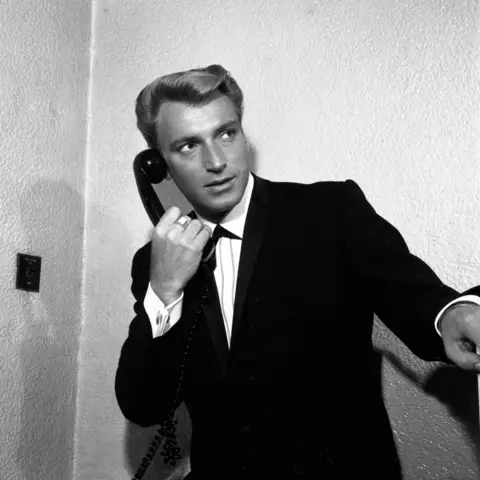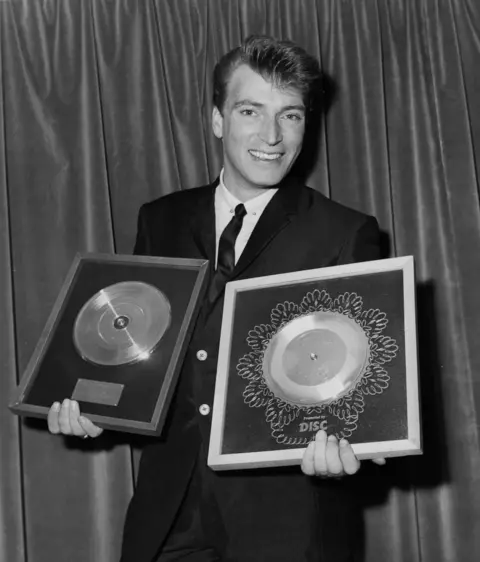Sixties pop phenomenon Frank Ifield dies aged 86
 Getty Images
Getty ImagesAustralian music icon Frank Ifield, who scored four UK number one hits in the 1960s, has died at the age of 86.
The country singer, who was known for incorporating yodelling into his songs, also gave The Beatles an early break by booking them as a support act in 1962.
In a career spanning seven decades, he recorded 25 albums and was presented with the Medal of the Order of Australia in 2009.
He died peacefully in Sydney on Saturday night, his former musical director Bob Howe confirmed to the BBC.

Ifield was born in Coventry, England, in 1937 to Australian parents. His father was an inventor who created the Ifield pump, a device used in fuel systems for jet aircraft.
In 1948, the family returned to Australia, where young Frank received a ukulele for his birthday and quickly learned how to play.
"It accompanied me to school one day, where the headmaster encouraged me to adapt Australian poetry to my own tunes and then perform them to the class," he later recalled on his website.
"This experience whetted my appetite for what I instinctively knew was to be my calling."
While still in his teens, he became a regular on popular radio show Bonnington's Bunkhouse, and headlined several country venues around Sydney.
Signed to EMI records, he released dozens of singles before national service put a temporary hold on his career in 1957.
After demobbing, he travelled back to the UK, where he quickly became a household name.
He scored his first number one in 1962 with a cover of I Remember You - originally written by US songwriter Johnny Mercer about his love affair with Judy Garland.
The yodelling ballad topped the charts for seven weeks, selling more than one million copies, and later hit number five in the US.
Ifield’s success was quickly followed by the songs Lovesick Blues (1962) and Wayward Wind (1963) - making him the second-ever artist, after Elvis Presley, to score three consecutive number one singles in the UK.
Allow Google YouTube content?
It was around this time that he met The Beatles' manager Brian Epstein while playing at the Liverpool Empire - which led to the band appearing (free of charge) at Ifield's show at the Embassy Cinema in Peterborough in December 1962.
He later released a compilation album in the US called Jolly What!, featuring eight of his songs paired with four early Beatles singles.
However, the popularity of the Merseybeat sound and the new wave of British rock 'n' roll quickly made Ifield's classic pop seem dated.
He continued to score hits until 1966 - including top 10 songs Confessin' and Don't Blame Me - but after that his chart career began to fade.
In 1966, he moved to Nashville, where he recorded two albums and made his debut on The Grand Ole Opry, introduced by his hero Hank Snow.
Ifield also entered the race to represent the UK at Eurovision on two occasions - in 1962 and 1976 - but was unsuccessful at the national selection stage.
His competitors in 1976 included Brotherhood of Man, who went on to win the contest with Save Your Kisses For Me.
In 1991, Ifield made a surprise return to the UK charts with The Yodelling Song - a dance remake of his 1962 track She Taught Me How To Yodel, which the Queen Mother once requested at a Royal Command Performance.
 Getty Images
Getty ImagesAfter returning to Australia, he was inducted to the Aria Music Awards' Hall of Fame, and was presented with a Medal of the Order of Australia for his “service to the arts as an entertainer” in 2009.
A bout of pneumonia in the 1980s led to a collapsed lung. After surgery, doctors told him he would never sing again.
However, with the help of vocal strengthening exercises, he managed to return to the stage.
"When I finally started performing again, I had to go carefully," he told the Daily Express in 2019.
"These days I might not be able to sustain a note for quite as long as I used to, but there is still plenty of power there."
He added: "I would be devastated if I couldn't sing any more."
In later years, Ifield's tours consisted of reminiscences about his life in showbusiness, interspersed with musical numbers.
He also remained active in Australian music and supported a number of young singers, including country musician Nicki Gillis.
He is survived by his wife, Carole Wood; two brothers, Bob and David; and the two children he shared with ex-wife, Gillian Bowden.
